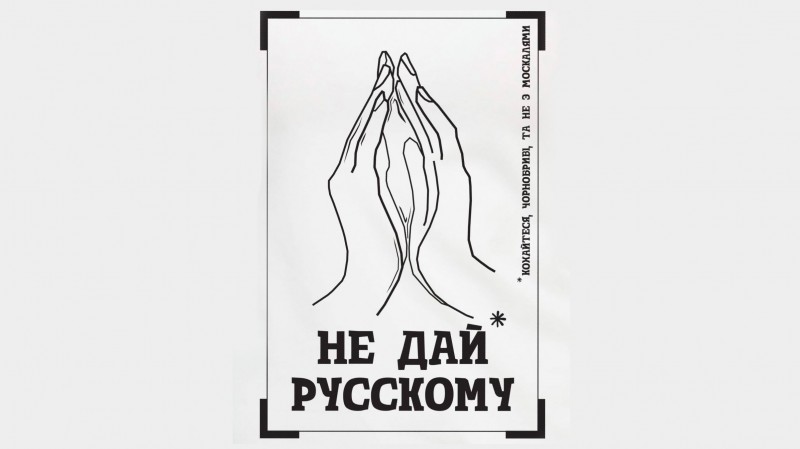In the wake of Russia’s annexation of Crimea, talk of international sanctions, it seems, has become just another humdrum fact of European politics. That could be changing, however. This week, a creative boycott began in Ukraine that is drawing the attention of Russian Internet users. Ukrainian women are organizing a new campaign called “Don’t give it to a Russian”—a sex embargo against Russian men. The effort complements a larger boycott [2] against Russian consumer goods, which even features some billboards [3] along highways throughout Ukraine.
The sex boycott already has its own line of t-shirts, all carrying the official logo: two hands clasped together, creating a shape that suggests an open vagina (see above). There is also a slogan: “Don’t give it to a Russian!” followed by a verse [4] from Ukrainian poet Taras Shevchenko’s 1838 poem “Kateryna”: “O lovely maidans, fall in love, but not with the Moskaly [the Russians].”
One March 23, Russian Internet users began circulating a photograph of opposition figure Valeriya Novodvorskaya wearing the sex boycott t-shirt. Novodvorskaya, who is notorious for her strange appearance and for promoting conspiracy theories, is Russian, but many online were ready to believe that a Russian oppositionist would join the boycott in solidarity with Ukraine against the Kremlin.
Russian parliament member Robert Shlegel, for instance, tweeted the image, with the following commentary:
Валерия Новодворская одним фото убила весь украинский секс-бойкот просто на корню.:) pic.twitter.com/8h3fcyxegN [5]
— Роберт Шлегель (@Shlegel) March 23, 2014 [6]
With one photo, Valeriya Novodvorskaya has killed the entire Ukrainian sex-boycott at its core. :)
As it happens, the image is photo-shopped. The photograph comes from an interview [7] Novodvorskaya gave in July 2013 on Russian-Israeli relations (hence the Israeli flag in the background). Someone with exceptional editing skills produced the boycott t-shirt version, leading to the avalanche of mockery and bad public relations online.

What you can do with photo-shop, apparently.
Right now, the Facebook group [8] dedicated to the sex boycott has just 156 members, but the campaign has gone viral among Russian Internet users, who have widely circulated a photo of two women wearing the official t-shirts (see below). Unsurprisingly, most of the Russian netizens responding to the boycott are men keen to crack sexist jokes about the effort. Egor Prosvirnin, chief editor of the Russian nationalist website Sputnik & Pogrom, wrote [9] on Facebook about the sex embargo, calling its participants prostitutes. Many others [10] on LiveJournal and elsewhere have made the same joke.
In fact, the two women in the photograph above are prominent professionals (and not of the “oldest [12]” variety). There is Katerina Venzhik [13] (left), chief editor of the news website Delo.UA, and Irina Rubis [14] (right), CEO of the business web portal Ekonomika Communication Hub [15]. The photograph is from March 21, 2014, at an event [16] by Delo.UA, where Venzhik announced the finalists in the website’s “Top 100 Businesswomen of Ukraine” competition. Rubis attended, where she and Venzhik posed for a few photographs. In one picture [11], both women wore the sex-boycott t-shirts over their clothes.
The concept of a sex boycott is at least 2,425 years old. That, anyway, is how long ago the Greeks first performed Lysistrata [17], a comedy about the women of Greece withholding sexual privileges from their husbands and lovers to force an end to the Peloponnesian War. The play was written seven years before Athens lost that war.
Hopefully, a kinder fate awaits Ukrainians seven years from now, in 2021.

